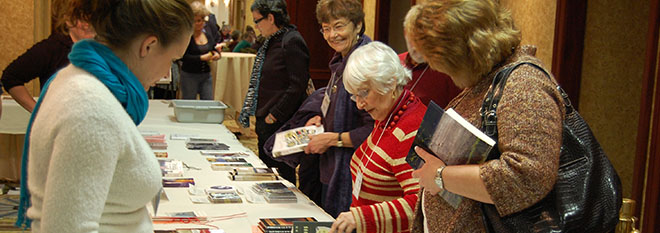This entry is part of Getaway Reads, a weekly e-mail series curated by Stephanie Cawley that features the writing of the Winter Poetry & Prose Getaway faculty.
The Book of Roger
by Richard K. Weems
Of course, near this tale’s end, the Book of Roger—that narrative of third person limited omniscience—is suffering an unexpected twist, isn’t it, Roger? Thus far, the tale of hardworking, bring-home-the-bacon Roger and his darling, quiet Rhonda, who experienced loss and more than their fair share of turbulent times in their initial stages when their first child gave up the ghost while still in his mother’s womb. But then came a successful birth and then another, a decade apart from each other, and at long last there were little ones to fill the vacant crib and jiggle the rattles from their packaging. Roger spent months on the road to ship cola; Rhonda kept house in Quakertown and worked short hours at Walgreen’s while Herman and Darrell went to school. Roger sent cards and gifts on important holidays. Herman went straight into the Air Force after graduation (Mountain Home, ID), and hasn’t visited once. When Darrell was a senior in high school, Roger retired and used Rhonda’s savings to close on a little house plopped into the center of an apple orchard in Beckett, NJ. With Darrell now a frosh at Rutger’s, wasn’t the Book of Roger supposed to fade off into an unexciting resolution?: Roger raising apples, Rhonda churning apple butter, apple turnovers, baked apples with cinnamon, poached apple in a reduced port sauce, apple stuffing, etc., that the two would devour together in their kitchen and give to neighbors, Roger and Rhonda finding some rest and peace in their retirement and admiring the sunset from their adjacent rockers on the porch. Even the tent caterpillar infestation didn’t present a hardship at first. Sure, Roger fought a losing battle: the hordes of sex lure traps overflowed in seconds, as did the Vaseline-smeared tape girdles around all the trunks. He emptied out at least a dozen tanks of Super BT as the vermin wriggled through one slow, bile-filled death at a time, but the light rain of larvae droppings remained persistent and unabated. No rocker-time to be had in that kind of rain. So Roger called the local distributor for a Sevin drop. He gave them his Visa number and scheduled the duster for just after dawn on the 24th. The distributor sent pamphlets full of thanks and instructions—evacuation of the premises for 48 hours, including household pets. The day before those blessed chemicals would come and wipe the orchard free of vermin, Roger taped the windows shut and made reservations for two at the Highlander Inn.
And then Rhonda’s bomb, revising the Book of Roger from its beginning.
Rhonda announced over dinner the night before that she was leaving for her sister’s in Ohio and not coming back. Rhonda explained in four hours of monologue while Roger stewed in confusion and silence that from her point of view this marriage ended when the first child was lost. Herman and Darrell helped soften the blow, but the two of them were free, and the time had come for her to do the same.
This orchard never inspired an ounce of hope or even a faint correlation to Eden in her, Roger. The gala apples came out sour and undersized and went untouched, even when left for nothing in baskets by the road. Rhonda went along with the loss of her savings and the move to another state because Darrell had enough loss in leaving longtime friends behind, but she saw no reason to put up with her husband any longer. She spoke at length in hopes that her husband would offer some explanations of his own and give her some insight into this man that she has seen as little more than a self-sustaining package. She never deluded herself into thinking that her dear Roger was absent of emotion, but she spoke at length to give him one last chance to reveal those emotions to her, to provide some kind of emotional “Hello, it’s me” and expose what he’d hidden from her since she first knew him. But that effort was a dismal failure, and she has nothing left to offer now on the night that she is leaving except an occasional “Excuse me” when her (now) ex-husband happens to be in her path while she and Darrell haul boxes out to her Volvo. Roger, that husband of hers could offer something more of a response than a dumb gesture during those uncomfortable moments.
Here is the full truth, Roger—Rhonda is tired of being the sole member of this marriage who is still upset over what was, in the Book of Roger, but an unfortunate circumstance ages ago. In the Book of Roger, the first child wasn’t worth all of Rhonda’s tears because it was never even born and so could not have died. According to the doctors, the fetus had been lost, like a pair of glasses, so Roger never bothered to notice how much Rhonda had reconstructed her life around the expectation of having a child to care for. Rhonda had even named him, Roger, and she had named the child after his father, so imagine how she felt when Roger, Jr. was buried and Roger, Sr. never visited the site. Roger, Sr. never recognized his title or his duties of fatherhood to his namesake and instead went back on the road and thought that doing so was providing for his wife, since there were hospital bills and funeral expenses to make good on. And Rhonda had to deal with her grief and abandonment and vacuous home all on her own. Face it, Roger—Roger, Sr. has been too much a wanderer in his own life. Might as well call him Ishmael—a naive man looking for a ship to sail, not noticing the dangers of the crew around him, or the uselessness of his mission.
Put the evidence together, Roger: Rhonda’s aloofness, both in conversation and bed, for a decade and a half before she would agree to get pregnant again; her tears when she looked at little, squirming Herman; her insistence that the child sleep in bed with mom and dad, even when dad was fresh off the road and hadn’t been with his wife in months. The children became perfect excuses to avoid all relations with her husband. Wasn’t it obvious that she was more animated with Herman and Darrell than she ever was when alone with the man she had married? She has been more at ease with that gravestone than at home—of course she has visited it, Roger. Even when Roger, Sr. blew Rhonda’s savings on a house and orchard to follow some sudden wish to be an apple-farmer, shuttling Rhonda and Darrell out there with him, Rhonda crossed the river and up 276 to visit that grave when she said that she was going down the shore on a bus with other retirees to feed quarters into slot machines. She confided in her unshared unhappiness to that chiseled slab of marble, and soon she found another willing audience member in the third fruit of her womb, blonde and bright-faced Darrell. While Roger, Sr. labored in the orchard, Rhonda told her son about his lost older brother and the emptiness of her marriage, and when Darrell left for college, he knew better than his own dad about the future of this marriage, and he knew whose side he was going to stand on. Now back to help his mother move out her things, he takes pleasure in his father’s broken-back stance and loss for words whenever he finds himself in Rhonda’s path. Herman is as much a lost cause as Roger, Jr. for support—he requested assignment in Idaho because he wanted a good excuse to never come home again and to avoid keeping in touch with a single soul who shared his surname. Roger, Sr. created kin that are as distant from him as galaxies, relations that barrel downriver from him as fast as the laws of momentum will allow.
So it goes, Roger. This is how the books ends. Rhonda leaves with Darrell and a trunkload of her things (all that she would ever want to remind her of her married life), and when the night starts easing up in the east, Roger, Sr. finds himself alone, all alone. He tears open all the windows that he had taken such time to seal and mans his rocker on the front porch, the front door wide open. He is not going to leave. This house, this orchard, was to be his gift to his wife and children, and even if none of them want another thing to do with him for the rest of their lives, he is going to cleanse it of this plague for them. When he sees the duster zoom past to case the drop area, he notes with what glare it reflects the morning beams. The single-prop craft shines with as much brilliance as the DDT truck did, the one that used to drive through little Roger, Sr.’s neighborhood, its rear apparatus atomizing that precious chemical that was at the time the savior of mankind, able to kill all the malicious insects and germs in the whole world. Little Roger, Sr. and his friends ran behind the truck and breathed in lungfuls of the stuff. It was the cleanest smell in the world, wasn’t it, Roger? And when the duster lets loose its goods, the cloud of Sevin hangs in the air like an amorphous paratrooper. Imagine being in the midst of that cloud, Roger. Imagine wafting down to obliterate the infestation in those trees. That cloud is the shape of a last stab at hope, Roger, and it is as lethal as hope has proven. Wish for no sudden change of wind speed or current. Let the cloud go where it has to. Continue this course. Accept this dreadful end.
© Richard K. Weems. Originally Published in Blip Magazine, Winter 2012.
+ + + + + + + + + +
Richard K. Weems is the author of Anything He Wants, winner of the Spire Fiction Award and finalist for the Eric Hoffer Book Award, as well as the Cheap Stories eBook series, available at Amazon, Barnes & Noble, Smashwords, and iBooks. He is the founder and director of the BCA Summer Writing Program, and his short story publications include North American Review, The Gettysburg Review, Other Voices, The Mississippi Review, Crescent Review, Pif Magazine, The Florida Review, Barcelona Review, and The Beloit Fiction Journal. His website links to some of his online stories: www.weemsnet.net.
+ + + + + + + + + +
Want to study with Richard K. Weems? At the 2013 Winter Poetry & Prose Getaway, Richard will be leading the Writing and Publishing Your Fiction Workshop. Click here to find out more.
+ + + + + + + + + +
Advance your craft and energize your writing at the Winter Poetry & Prose Getaway. Enjoy challenging and supportive sessions, insightful feedback, and an encouraging community. Learn more.




